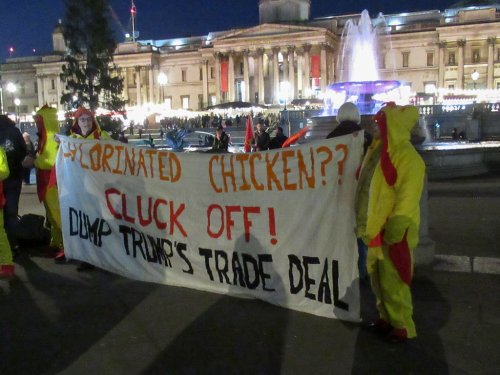The Guardian | 12 October 2020
Campaigners in last-ditch push to protect farming standards post-Brexit
by Fiona Harvey
Campaigners are staging a last-ditch attempt to enshrine food safety and animal welfare standards in UK law after Brexit, as the agriculture bill returns this week for debate and a series of votes in both houses of parliament.
The government is said to be adamantly opposed to legislating for a continuation of the high standards required under EU law, with farmers asked instead to rely on ministerial assurances that standards will be upheld after Brexit. A spokesperson dismissed concerns as “unhelpful scaremongering”.
Thousands of people signed online petitions and wrote to their MPs over the weekend, as green campaigners and farmers’ groups raised awareness of the issue. The National Farmers’ Union has gathered more than 1m signatures for its campaign, which is also supported by the chef Jamie Oliver.
Farmers are concerned that allowing food to be imported that does not meet the UK’s current safety and animal welfare standards will open the country up to inhumane and unsafe imports, and undermine domestic production. They are not convinced by assurances that ministers will uphold standards post-Brexit without a legally binding commitment in the agriculture bill.
Several amendments thave been tabled in the bill’s passage through the Lords, but most are likely to fall unless a last-minute deal can be found with wavering “green Tory” MPs.
Katie White, the head of campaigns at the World Wide Fund for Nature, said: “MPs must seize this historic moment to support British farmers and protect the health of people and planet by voting through improvements to the bill that enshrine our high food and environmental standards in tough nature laws for generations to come.”
The Guardian understands, however, that a sizeable Tory rebellion is unlikely and major concessions are likely to be rejected, although there could be compromise on other issues.
Ministers have repeatedly said that chlorinated chicken and hormone-treated beef from the US would continue to be banned in the UK, but have offered less concrete assurances on other aspects of food safety. In the government’s view, enshrining a commitment to EU or equivalent standards in the agriculture bill would tie the hands of negotiators seeking a post-Brexit trade deal with the US, which wants its agricultural producers to have full access to the UK market.
Sonny Perdue, the US agriculture secretary, said last week: “We absolutely will not agree to policies that restrict our methods of production to any other standards outside of this country [the US]. While we will absolutely accede to international standards of health and safety which we believe to very measurable and objective, we do not intend to abide by any types of methods of production based on perception or anything else that’s not scientific.”
The Future British Standards Coalition published a report on Monday showing that trade bills were possible even if the UK were to mandate higher standards in domestic law. The FBSC is concerned that current provisions in the agriculture bill have loopholes that would allow standards to be weakened without consultation.
Under current government plans, the Food Standards Agency would prepare reports on foods and agricultural products and imports before they could enter the UK market. The reports would be sent to ministers, who would then make the decision on whether or not to accept the advice. Ministers could also change existing food and agricultural production standards without the need for a parliamentary debate or vote.
The government has set up a Trade and Agriculture Commission to provide assurances that standards will be upheld, but it has been criticised as lacking real powers.
A government spokesperson said: “This government has been clear it will not sign a trade deal that will compromise on our high environmental protection, animal welfare and food standards, and claims to the contrary are unhelpful scaremongering. We are a world leader in these areas and that will not change.
“Chlorinated chicken and hormone-injected beef are not permitted for import into the UK. This will be retained through the EU Withdrawal Act and enshrined in UK law at the end of the transition period. The government is focused on getting trade deals that protect and advance the interests of our farmers and consumers. If a deal isn’t the right one, we will walk away.”
Campaigners are also hoping that an amendment on the use of pesticides may garner some support from MPs. Under the amendment, which had substantial support in the Lords, pesticide use would be restricted around schools, nurseries, hospitals and homes.
There may also be further assurances from ministers on government plans to pay subsidies to farmers based on the actions they take to protect the environment, instead of payments based mainly on the hectarage of land they farm, as at present.
